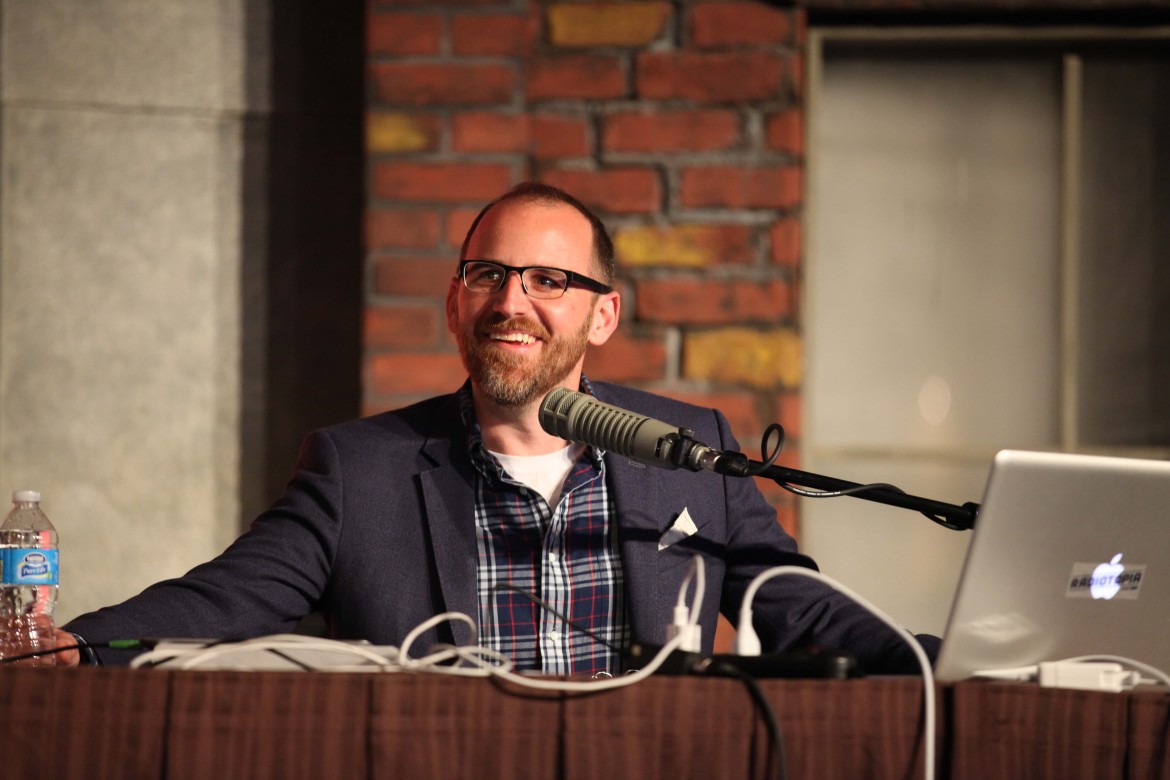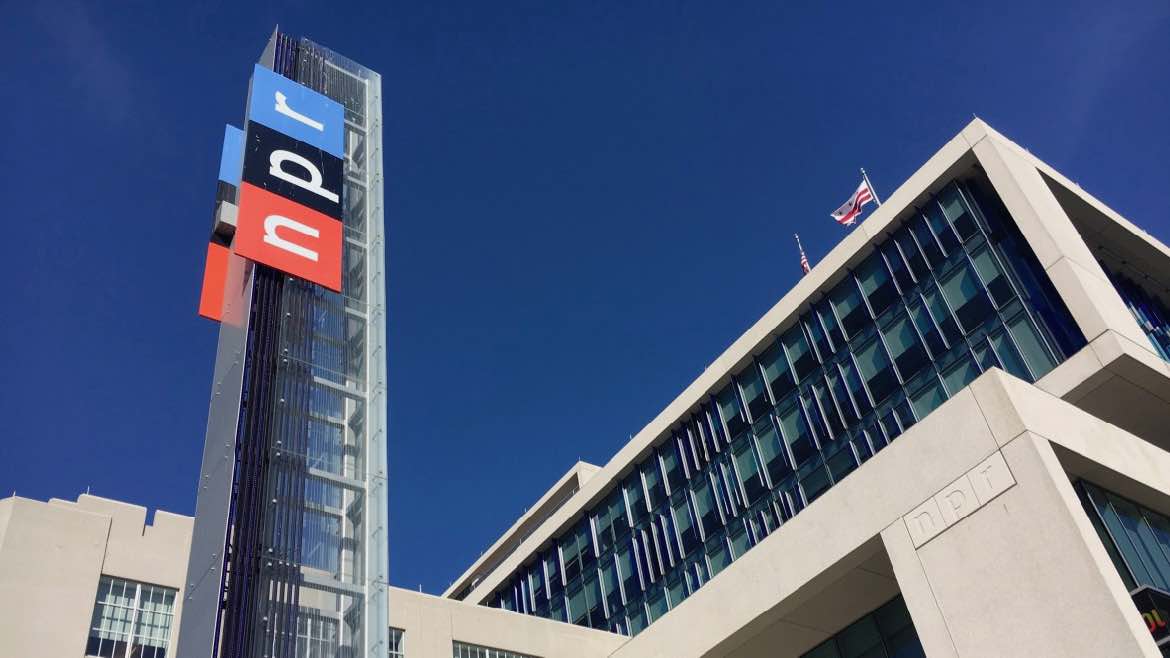What a public radio program director learned at Podcast Movement 2015

Roman Mars speaks at Podcast Movement 2015. (Photo: Podcast Movement)
Over 1,000 people made the trek to Fort Worth, Texas, Friday through Sunday to attend one of the world’s largest podcasting conferences, Podcast Movement 2015. Here are a few things I learned:
1. Roman Mars is a hero.
We all know this, of course, but the regular people at the conference realized it, too. His podcast 99% Invisible, part of PRX’s Radiotopia, won the heated competition for the People’s Choice award, voted on live by the audience, to raucous applause during The Podcast Academy Hall of Fame Ceremony. 99% Invisible was up against Building Disney Magic, hosted by Lee Cockrell and Jody Mayberry, and Smart Passive, with Pat Flynn. 99% also won an award for best podcast in the Society & Culture category.
Roman was tough to have a conversation with, as fans sidled up for selfies with him every few minutes any time I had a chance to chat with him. During his keynote address, he was asked how someone could get to do what he does for a living. “Be nice,” he said. Also: “Edit. Then edit again.”
2. I want to be Marc Maron’s neighbor.
Marc Maron replaced Glenn Beck as one of the main speakers and gave attendees some insight into his recent President Obama-in-his-garage interview. I’m always attracted to “I was at the end of my rope and didn’t know what else to do” success stories, but Marc Maron’s had an especially astute lesson. Part comedy routine, part content tips, Maron’s advice was the best of the conference. When asked how to be a good interviewer, he replied, “Listen.”
3. We still have a problem with radio “dudes.”
I saw a good mix of male and female attendees, but the conference itself had 17 female keynote and session leaders and 42 male. There were seven listed female panelists and 23 male. Some session leaders were also on panels. The workshops were well-balanced, with four females and five males. The Podcast Academy itself has four women and 18 men.
The panel I was on, “Podcasting Meets Radio,” was three females and one male, and the male moderator did a good job of giving equal time. I did hear that at a session with Lea Thau, the creator and host of Strangers, the crowd demanded to hear from her after too much time was spent addressing the male panelists. Thau later said that the moderator had planned questions for her but hadn’t said so, and the audience thought he was ignoring her.
I talked with one attendee who had an internship at a major network and was told to “stop talking like a girl and stop saying ‘like.’” She was crushed and has been hesitant to get back into broadcasting and podcasting. I am going to try to help her regain some confidence.
4. Pubmedia people should attend at least one non-pubmedia conference a year.
It was good to feel a little out of place at Podcast Movement and to have conversations with people from a non-acronymed world. The abundance of wealth-building podcasters and speakers, combined with my highly tuned skill of identifying promotional language, hurt my head a bit. But the devotion and overall energy of the attendees was hard to ignore.
Public media may be producing the best podcast content, but for how long? Also, the mechanical bull at the Saturday night party was something I’ve never seen at a PRPD conference. But hey, there’s still time for Pittsburgh.
5. I got whiplash from the speed of just “going” with an idea.
I met with Parviz Parvizi from the app company Clammr in the lobby after the conference. We talked about how we should find something to work on together. I’m looking for ways to discover new content and new talent; can he help? We developed an idea and hope to launch the project within a month.
What if we in public media just went out and tried more things? If we got a bunch of makers and innovators in a room with audio people and built and implemented something without going through layers of administration? Just did it? Like Google’s “Fail fast.” It may involve taking a chance with our brand, but if the project is in line with our mission, shouldn’t it happen?
We’ve seen public television get bowled over — This Old House is the original HGTV — and we all have friends at newspapers who have been affected by their industry’s too-slow embracing of change. Can public radio be the one that learns? If we all just embrace a little change, we will be the medium that not only stays afloat, but leads.
Tammy Terwelp is director of content & programming at WESA in Pittsburgh. She has also worked in television, radio and digital content at Wisconsin Public Television, Wisconsin Public Radio, Lehigh Valley PBS and WTTW and WBEZ in Chicago, specializing in operations, broadcast media programming, digital content production, direction and distribution.
Related stories from Current:
- The Pub #26: The business of podcasting, live from the PMDMC Conference
- Women’s podcasting festival brings together “kindred spirits”
- Not just about the money: Public radio veterans drawn to creative freedoms of podcasting
Clarification: This commentary has been updated to reflect Lea Thau’s account of the session at which she appeared, which she shared after the commentary was posted.









+1 to everything here, especially 4 and 5.
Great writeup Tammy, very good to hear from your perspective. Also, congrats on the line out the door of your session…incredible!
Appreciated this very much Tammy. So glad you felt I gave the female panelists equal time during the Radio Meets Podcasting panel. It was a pleasure to work with you on this. Hopefully, we can do it again sometime.
Tammy, enjoyed the write-up. Seth Resler from our company is a podcaster himself & also attended #PM15 and had similar observations, including “Where were all the broadcasters?” Thanks for another POV.
From my own personal peanut gallery: the problem with a “fail fast” mentality is that the relationship with the consumer is quite different than in public media. With “fail fast”, the lag time between initiation and determination of success/failure can be made to be very quick. Either a new design increases web traffic or it doesn’t. Either a product sells more widgets or it doesn’t. Many of these concepts/items are also being spread across a big enough consumer data set that you can easily A/B test many subtle options without risking too much negative response from any one consumer group.
Public radio has expressly positioned itself to be in a “long term relationship” with its consumers. That’s how it gets people to donate, after all. But it also means it can months, if not years, to determine whether or not something is “successful”. Worse, we usually get the negative feedback quickly but the positive feedback is what takes time to arrive. And even worse than that is that radio especially is consumed passively. It’s very hard to track radio consumption with anything approaching accuracy, and there’s significant lag time between the event and when the tracking data is available.
On some fronts, admittedly, this is changing. For example, while not perfect, NPR ONE is giving us access to certain data sets that can provide a success/failure determination much more quickly. And while right now it is exceedingly difficult to provide A/B feeds for programming, the project to distribute public media programming via landline fiber has intriguing possibilities in that regard.
BTW, I should be clear: this is a GREAT article. I’m going to plan to attend next year’s conference if I can. Is it always in Fort Worth? I hope so, I’ve got a free place to stay with my inlaws near DFW. :)
puh-reach it, Tammy!